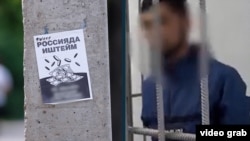In the Kyrgyz capital, Bishkek, it's not hard to find an offer of a high-paying job in Russia.
Ads posted around the city promise job-seekers a chance to earn $1,000 a week -- double what most Bishkek residents earn in a month. The ads say the job requires just three to four hours of work each day, and the worker's travel costs to Russia and housing will both be paid for.
When RFE/RL contacted the Telegram account listed on the ads, a reply came back confirming that the work would involve transporting illegal drugs.
It's an offer that many Kyrgyz citizens have taken, despite the serious risks. Drug-trafficking charges in Russia can result in prison terms of 20 years to life.
"The 'career' of a drug courier is very short -- at best, they last two weeks," Mirlan Toktobekov, an immigration lawyer, told RFE/RL. "Of all the crimes committed by Kyrgyz citizens in the Russian Federation, the majority are drug-related. I recently took part in a court case where a Kyrgyz citizen, born in 1998, was sentenced to 15 years for simply transporting a package," Toktobekov said.
In some cases, smugglers recruited into the business are reported to the authorities by traffickers higher up in the organization. "When it's time to pay [the couriers], the organizers themselves turn them over to the police, and they are detained," Toktobekov said.
In those cases, foreigners working in the Russian drug trade have few resources to defend themselves. "The rights of our citizens [in Russia] are very poorly protected," Toktobekov said. "Additional charges can easily be pinned on them. People from Central Asia are an easy target for these schemes."
Kyrgyzstan's Interior Ministry said authorities are working to track down the organizers who recruit Kyrgyz citizens into criminal activity in Russia.
Kanybek Usenov, a representative of the Drug Control Service within the Interior Ministry, said the investigative work is being conducted in cooperation with Russia and other Central Asian governments. In one recent operation, Kyrgyz authorities shut down an online site selling drugs and detained three suspects: a Kyrgyz citizen, an Uzbek, and a Russian.
"Since everything happens online, it's very difficult to determine [the traffickers'] location," Usenov said. As for the recruitment efforts, Usenov said "these ads are posted by our own citizens."
For foreign nationals who face trafficking charges in Russia, the consequences can go beyond a prison sentence.
More than 30,000 foreign citizens are currently detained in Russian prisons, according to the head of Russia's Federal Penitentiary Service. Nearly 70 percent of them are from Central Asian countries.
Those inmates are frequently recruited to fight in Russia's war in Ukraine.
According to Ukraine's I Want To Live project, which gives occupying soldiers an opportunity to surrender, more than 3,000 Central Asian citizens are now fighting in Ukraine alongside Russian forces.













